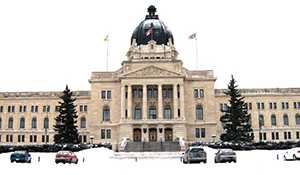Komarnicki’s freedom of conscience motion passes
June 23, 2015, 1:51 am
Kevin Weedmark


Just before the House of Commons adjourned for the summer and Souris-Moose Mountain MP Ed Komarnicki said goodbye to Paliament forever, Komarnicki’s motion on freedom of conscience for Members of Parliament passed almost unanimously.
The House of Commons voted 273 to 1 to endorse Motion 590, moved by Komarnicki in late May, which stipulates “That, in the opinion of the House, all Members of Parliament should be allowed to vote freely on all matters of conscience.” The only no vote was registered by Conservative MP Gordon O’Connor, a former defence minister and government whip, while a few MPs abstained from voting on the motion.
Komarnicki says it’s important to affirm the right of MPs to vote according to their beliefs on “matters of conscience.”
“I think it’s important to have the members have that ability and right on whatever issue relates to conscience matters,” he said, “whether it be a government bill, a private member’s bill, a motion or anything like that.”
Komarnicki said the motion was a good way to wrap up his parliamentary career.
“It’s a bookend to my career,” he said. “My first major speech was with respect to the definition of marriage, and then when it ended I was able to speak to this motion with issues related to life. Both of those are very important issues to me. The motion was a platform for me to speak my mind on something very important to me.”
He said he hopes his motion has some impact.
“It’s created a certain amount of debate in the media, and I hope it has an impact going forward. I was able to express myself on an issue that is very important to me. I think MPs have a responsibility to vote by their conscience. I’ve said I think conscience trumps even the Charter.”
Komarnicki defined the concept of matters of conscience as anything that might result in the ending of a life.
“There may be a great deal of debate and some difference of opinion on what are matters of conscience. I can, however, say with a great deal of confidence that matters relating to life, more particularly to the termination of life at any time from the point of conception to the point of natural death, would easily fall within that definition. Whether or not to terminate before death naturally occurs, or to terminate a life before it fully becomes a living being or while it has the potential to be a living being is certainly a matter of conscience, as may be a number of other matters falling somewhere between these two.
“In my view, a matter of conscience would arise out of a religious, moral or ethical issue that has to do with one’s inner sense of what is right or wrong.”
Though the Conservatives committed in 2006 to free votes on all matters except the budget and the estimates, the party has come to include “core government initiatives” in its official understanding of party discipline.
This is what Komarnicki had to say about his own motion during debate in the House of Commons:
“Mr. Speaker, my motion has a number of significant points that I am asking the House to support: first, that the motion apply to every member, regardless of rank or position in the House or party, and on all matters that come before the House captured by this motion whether in the nature of private members’ motions or bills, government bills, motions or other legislative initiatives; second, that members be allowed to vote freely, meaning without order or demand by party leaders, House leaders, whips or anyone else in the party structure, to vote in a certain or particular way on pain of censure or sanction if they will not; and third, that this would be so in matters of conscience.
“There may be a great deal of debate and some difference of opinion on what are matters of conscience. I can, however, say with a great deal of confidence that matters relating to life, more particularly to the termination of life at any time from the point of conception to the point of natural death, would easily fall within that definition. Whether or not to terminate before death naturally occurs, or to terminate a life before it fully becomes a living being or while it has the potential to be a living being is certainly a matter of conscience, as may be a number of other matters falling somewhere between these two.
“In my view, a matter of conscience would arise out of a religious, moral or ethical issue that has to do with one’s inner sense of what is right or wrong. The right to freedom of conscience is represented in all international conventions concerning human rights. Article 18 of the Universal Declaration of Human Rights, adopted by the General Assembly of the United Nations on December 10, 1948, states, ‘Everyone has the right to freedom of thought, conscience and religion.’ There is no question that one’s conscience is and ought to be sovereign. Fast Email Extractor https://letsextract.com/ Download LetsEXtract Email Studio
“In fact, the Canadian Charter of Rights and Freedoms, commonly referred to as the charter, states, in paragraph 2, with regard to fundamental freedoms, ‘Everyone has the following fundamental freedoms: (a) freedom of conscience and religion.’ This fundamental freedom is found alongside those freedoms that we cherish: freedom of expression, freedom of the press, peaceful assembly, and freedom of association. In fact, the first words in the preamble in the Canadian Charter of Rights and Freedoms gives rise to potential conscience struggles that may occur when interpreting laws or even with respect to charter matters when it states, ‘Whereas Canada is founded upon principles that recognize the supremacy of God and the rule of law,’ is bound to bring the rule of law, the supremacy of God into conflict at times.
“When it comes to matters of conscience, Sir Thomas More said it best when he had to make a decision whether to obey God’s law as he saw it rather than man, that one should be most cautious not to offend his conscience than anything else in the whole world. Of course, his head was taken off and placed on the Tower Bridge in London as the price for not offending his conscience.
“An email made public, sent to the member for Papineau, the Leader of the Liberal Party of Canada, by former Liberal members of Parliament also made the point well when they stated in part:
“We, the undersigned, former Liberal Members of Parliament, are concerned about your recent pronouncement that people who hold a particular view on a given moral issue, as a matter of conscience, cannot be Liberal candidates for the position of MP unless they agree to park their consciences at the entrance to the House of Commons and vote directly opposite to their fundamental beliefs, as directed by you.
“In the House, the Conservative Party has on a number of occasions allowed for free votes, and that is the way it should be. The party policy also states very specifically in section 7 that the party believes in restoring democratic accountability in the House of Commons by allowing free votes. It states all votes should be free, except for the budget, for obvious reasons, main estimates, and core government initiatives.
“On issues of moral conscience, the Conservative Party acknowledges the diversity of deeply held personal convictions among individual party members and the right of members of Parliament to adopt positions in consultation with their constituents and to vote freely.
“The Supreme Court of Canada’s decisions on the recent Lee Carter, et al. v. Attorney General of Canada, et al. decision, commonly referred to as the Carter decision, which related to end-of-life issues, and R. v. Morgentaler, commonly referred to as the Morgentaler decision, related to abortion, fall into the category where actions taken in the House should be the subject of free votes. In each case, the court relied on the Canadian Charter of Rights and Freedoms and gave the House the benefit of the court’s view on the charter’s application.
“The Carter decision essentially referred to section 7 of the charter, which reads:
“Everyone has the right to life, liberty and security of the person and the right not to be deprived thereof except in accordance with the principles of fundamental justice.
“The decision said that it would require legislation allowing for physician-assisted death for a competent adult who clearly consents to the termination of life and has a grievous and irremediable medical condition, including an illness, disease or disability that causes enduring suffering that is intolerable to the individual in the circumstances of his or her condition. I may not agree with the court’s logic in the use of section 7, but it has said that and it has said that Parliament needs to address that.
“The type of legislation, the substance of the legislation and the views of the members may vary. Many members may struggle in deciding in good conscience whether or not they should support that piece of legislation, another piece of legislation or something in between. However, when it comes before the House for a vote, it should be a free vote.
“Similarly, in the Morgentaler decision, the court decided in essence that the Criminal Code provisions then existing regarding abortion offended the same section 7 rights. The court was also of the view that it was Parliament’s prerogative or obligation to put forth legislation, not theirs, that would balance this right with the rest of the charter that would provide for the protection of the unborn. In fact, section 1 of the charter states: ‘The Canadian Charter of Rights and Freedoms guarantees the rights and freedoms set out in it subject only to such reasonable limits prescribed by law as can be demonstrably justified in a free and democratic society.
“It is all conditional. This clearly indicates that there must be a balancing of interests, or at least a consideration of interests, if one truly wishes to rely on the charter . . .
“There is no doubt that members feel strongly on matters such as this, relating to issues of life. Some would feel strongly that life is sacred and that they should not be required to vote for any legislation that is against their conscience if it takes or allows for the taking of such life after conception before natural death. These may be absolute positions, but on all matters of life, there may also be positions somewhere in between, where honest, sincere and good thinking members will, I am sure, struggle with their decision and differ in their views. Ultimately, however, they should all be free to vote with their conscience.
“By allowing members to vote freely, it presupposes that members of differing points of view and different persuasions, personal convictions and religious beliefs are allowed to run for public office and to be elected by constituents. To say, as the leader of the Liberal Party, the member for Papineau, stated, that anyone who has a view other than what is commonly referred to as a ‘pro-choice’ view cannot run for the office of a member of Parliament or, at the very least, would not be given a free vote on the same issue runs absolutely contrary to this motion, as well as the Charter of Rights and Freedoms. Indeed, it would run against the fundamentals of democracy, where issues should be debated freely and then voted upon.
“The very definition of ‘Parliament,’ which I have taken from How Parliament Works, by John Bejermi, stems from the French parler, meaning ‘to speak’ or ‘to discuss.’ ‘Parliament,’ then, or this House is a meeting place where the representatives of the people can speak, discuss, criticize, argue and express their opinions publicly on all matters of state.
“In Canada, therefore, we have a system called ‘parliamentary government.’ It is regrettable that because of the positions taken by leaders like that of the Liberal Party, some of the press, the media, and others, we cannot have a good or reasonable debate on these issues, with contrary points of view, without it seeming to be something unusual, unacceptable, or in bad taste. It is most unfortunate. This has to change in this House. For too long we have felt that difficult issues should not be moved, debated, or discussed in Parliament, many times simply because we have strong views on the subject and do not want to entertain anything else. That is not what democracy is about.
“When it comes to matters of conscience, there should be nothing that causes an MP to vote contrary to his or her conscience, for if members are forced to cross that line, they have violated who and what they are and what they believe in. I dare say that it is self-evident that no one should be required to do that. Their conscience is sacrosanct, inviolable, and should not be impinged upon, for indeed if it can be, what value is the opinion or vote of those members going forward and what reliance can be placed upon them. I think most Canadians and most constituents would expect no less from their members, even if they disagreed or had a different point or a different position. If the majority of constituents disagree, they should then elect a new member.
“In the same email sent to the member for Papineau and leader of the Liberal Party of Canada by former Liberal members, they made this point quite well when they stated:
“Second, since your edict singles out the issue of being opposed to abortion, but only that issue, it clearly discriminates against a select class of people, namely those who oppose abortion, and no one else, such as those who might oppose, or be in favour of, say, assisted suicide. We believe that such discrimination is a clear violation of the spirit, if not the letter, of The Charter of Rights and Freedoms, section 2 (a) which guarantees everyone, even Liberal Members of Parliament, ‘freedom of conscience,’ and (b), which guarantees everyone, even Liberal Members of Parliament, ‘freedom of thought, belief . . . and expression.’
“In my view, we need to get off the premise that some subjects are off limits for debate. We should have legislation go forward, agreeing that this is precisely the place where hard and difficult decisions must be made, accepting the fact that members may have to struggle with their conscience to support a particular position. In the interest of democracy, justice and good government, we want all members to vote on these issues freely and without impediment. I am hopeful and expect that not only my colleagues on this side of the House but all members of Parliament will see fit to support Motion No. 590.
“This motion is straightforward and unambiguous. Matters of conscience for obvious reasons should be subject to free votes. I think it is a timely motion, especially given the most recent Supreme Court of Canada ruling in the Carter case and the languishing ruling on the Morgentaler case, which so far parliamentarians have not been able to face head-on or even in a peripheral way.”



































